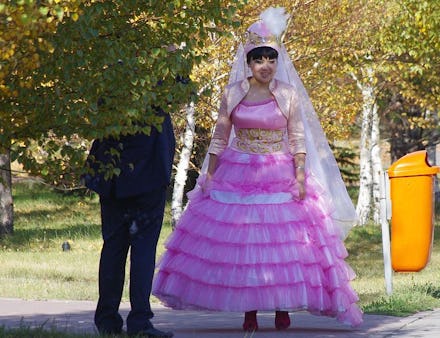This is What Polygamy in Kazakhstan Has to Do With Sugar Babies in America

The woes of sky-rocketing prices and unemployment have hit young people hard, with 7.5 million unemployed worldwide. That struggle to pay the bills means that young people must look to unconventional alternatives to make ends meet.
In Kazakhstan, some women are turning to polygamous relationships. Other young women in the United States are resorting to becoming sugar babies. Both cases conjure questions of how gender equality is exacerbated by a bleak economic situation.
Kazakhstan, perhaps best known to western audiences as the home country of the fictional character Borat, has been plagued by a large income disparity since achieving independence in 1991. Fifty six percent of the population earns less than 36,000 tenge (roughly $236) a month, while 1.5 million people in the country make less than 15,000 tenge.
Couple these circumstances with the 2008 financial crisis, and you have the perfect recipe for young women ready to become tokals — the Kazakh term for the younger of two wives who recieves an apartment, a car, and a monthly allowance. Men choose to take on a second wife as a sign of prestige, or for the more practical reason of bearing more children.
A 23-year-old waitress named Samal told Bloomberg she would leave her boyfriend to become a tokal as she struggles to pay for rent and tuition.
"Every woman wants to be the first and only love for a man," she said. "But it's becoming increasingly difficult for me to struggle alone."
The Convention on the Elimination of All Forms of Discrimination against Women (CEDAW) — which Kazakhstan has ratified — condemns polygamy. In fact, according to a survey conducted by Pew, 62% of the country's Muslims believe that the practice is morally wrong. But the increased appeal of becoming tokal for young women exemplifies the inextricable link between economic and gender inequality. Now, close to 20% of women surveyed believe that polygamy is not a bad idea. Polygamy was decriminalized in 1998, but is still technically illegal.
Many women become tokals through Islamic marriage, know as the nikah, with the permission of the senior wife. Debate over its practice has been discussed in the Kazakh parliament as recently as 2008, but failed to achieve any momentum after a female parliamentarian added a section about polyandry (having mutliple husbands).
While U.S. women face a different reality than women in Kazakhstan, some of the troubles are the same: increasing tuition and a high cost of living.
In some cases, this causes many young female college students and graduates in America to service the needs of "sugar daddies," who are often older, wealthier, married men who provide money in exchange for company and sexual services.
An informal survey conducted by SeekingArrangement.com among female NYU and Columbia students shows that the number of women willing to become sugar babies is 63% and 47%, respectively. Several websites promise to link up desperate college students with "sugar daddies" if they are looking for someone to hang out with. While some state that this is a mutually beneficial, no-strings-attached relationship, they can also be viewed as exploitative.
Some critics even liken it to prostitution. An NYU student shared that a man in his early 30s began licking the contours of her inner ear on a second date. While many sugar babies say that sex is often part of the work they do, they don't mind because it is "empowering that someone wants to pay to spend time with me," according to one.
For women in Kazakhstan, becoming a tokal is the end of hoping for true love. Marriage is binding, linking the tokal and husband for life. While the relationship is much more casual in America, it may becomes difficult to leave if the male is abusive. Interestingly enough, there are more resources online for how to attract and keep a sugar daddy than there are for how to get rid of one.
Writing for the Guardian in October, academic Nancy Fraser wrote about how feminism "has become entangled in a dangerous liaison with neoliberal efforts to build a free-market society." Both of these phenomena show that she's right: feminist gains mean nothing without remedying our ever-widening economic gap.